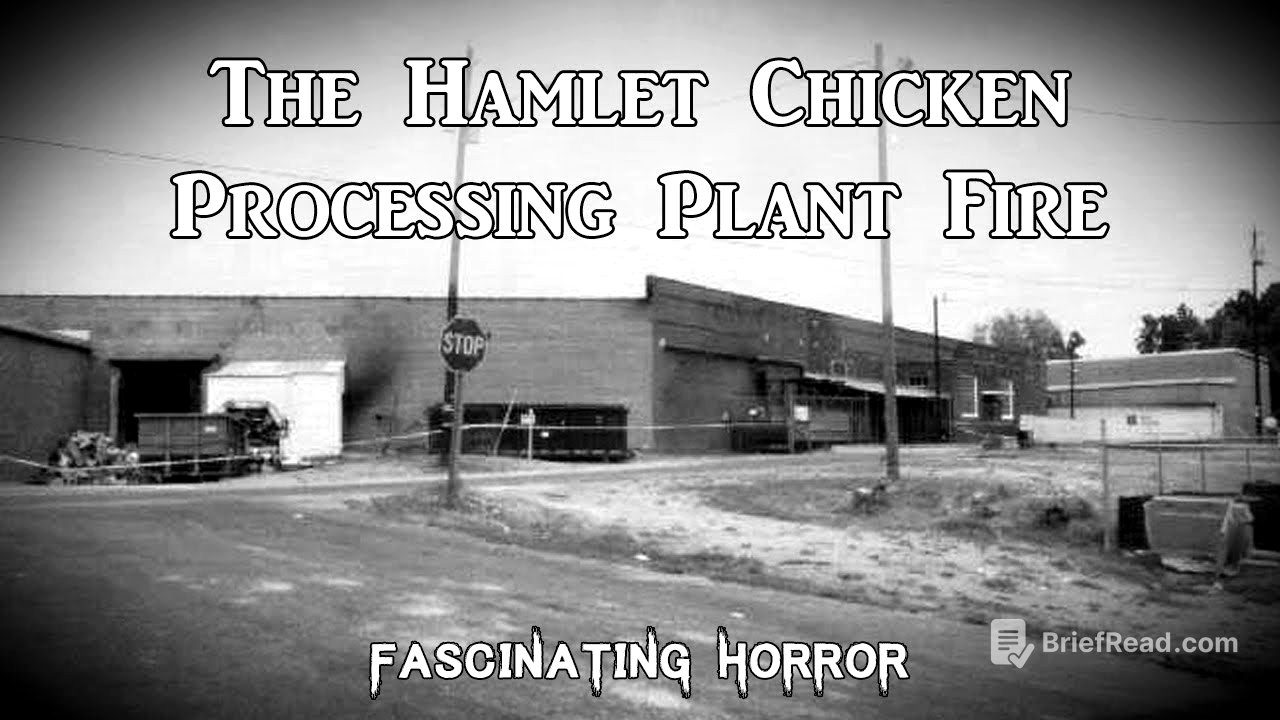TLDR;
This video recounts the devastating fire at the Imperial Food Products chicken processing plant in Hamlet, North Carolina, on September 3, 1991. The fire, which resulted in 25 deaths and 54 injuries, was a consequence of the plant's long-standing neglect of safety regulations and evasion of inspections to cut costs. The summary covers the plant's history, the events leading up to the fire, the disaster itself, and the aftermath, including the legal repercussions and changes in safety regulations.
- The plant had a history of safety violations and neglected maintenance.
- The fire was caused by a faulty hydraulic line and exacerbated by flammable materials.
- Locked and blocked exits contributed to the high death toll.
- The incident led to significant reforms in North Carolina's safety inspection processes.
Intro [0:00]
On September 3, 1991, a fire erupted at the Imperial Food Products chicken processing plant in Hamlet, North Carolina. The fire proved unusually devastating, and the subsequent investigation revealed a history of regulatory neglect and inspection evasion at the plant. This negligence, driven by cost-cutting measures, ultimately led to a tragic loss of life for the plant's workers.
Background [0:38]
Imperial Food Products was established by Emmett Rowe in the 1970s, focusing on processing and supplying chicken products to various companies. Rowe expanded his business by acquiring a factory in Hamlet in 1980, which his son, Brad Rowe, managed. The Hamlet plant, formerly an ice cream factory, was strategically located near chicken suppliers and distributors, with access to a cheap labour force due to the area's job shortage. Despite extensive renovations, the plant faced numerous issues from the start, including the owners' failure to obtain necessary licenses to avoid costs and inspections. The plant was also accused of contaminating the town's water supply and experienced several small fires, one of which disabled the sprinkler system, which was never replaced. The Rowe's were able to avoid consequences due to the factory's importance as an employer and contributor to the town's economy, leading officials to overlook the safety violations.
The Hamlet Chicken Processing Plant Fire [4:05]
On the day of the fire, workers were repairing a leaking hydraulic line on one of the machines. Despite a request for a new line, the Rowes insisted on using a spare part to save money. The spare line was too long, so workers cut and connected it using an improvised connector while the factory was operational. Shortly after the machine was put back into use, the connector failed, spraying flammable hydraulic fluid across the room. The fluid ignited upon contact with a cooker's heating element, causing a rapid fire. The fire was fuelled by chicken grease, cooking oil vats, and gas supplies, producing intense heat and poisonous gas. Workers tried to escape, but many found fire exits locked or blocked. The manager, Brad Rowe, attempted to call the fire department, but the phone lines had burned through, forcing him to drive to the local fire station. The local volunteer fire department was not called due to the fire chief's personal prejudices, delaying the response. Bystanders and survivors worked to clear exits, but by the time the fire was under control, 25 people had died, and 54 were injured.
The Aftermath [7:17]
Following the fire, OSHA conducted an investigation and found multiple safety violations, including locked fire exits, which workers reported were to prevent theft. It was determined that most deaths could have been avoided if the plant had complied with safety standards. While the plant was inspected for food safety, the same attention was not given to worker safety. Emmett Rowe was charged with 25 counts of involuntary manslaughter but received a plea bargain, resulting in a prison sentence of just over 19 years, of which he served only four. Imperial Food Products was fined $808,150, but the company declared bankruptcy and was unable to pay. The site remained a reminder of the tragedy until it was cleared in 2002. The state of North Carolina overhauled its inspection processes, focusing on high-risk industries, increasing the number of inspectors, and raising fines for violations. Many food processing companies voluntarily improved safety measures to distance themselves from the Rowes and Imperial Food Products.









